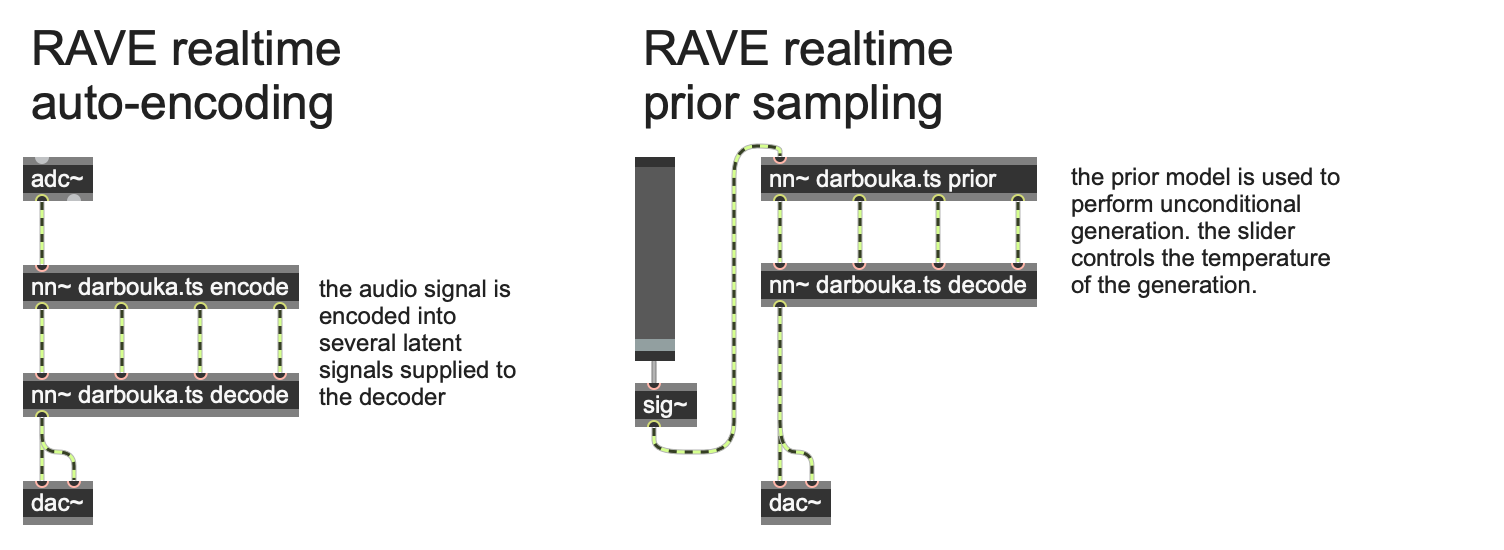Official implementation of RAVE: A variational autoencoder for fast and high-quality neural audio synthesis (article link)
RAVE needs python 3.9. Install the dependencies using
pip install -r requirements.txtBoth RAVE and the prior model are available in this repo. For most users we recommand to use the cli_helper.py script, since it will generate a set of instructions allowing the training and export of both RAVE and the prior model on a specific dataset.
python cli_helper.pyHowever, if you want to customize even more your training, you can use the provided train_{rave, prior}.py and export_{rave, prior}.py scripts manually.
Once trained, you can evaluate RAVE and the prior model using
import torch
torch.set_grad_enabled(False)
from rave import RAVE
from prior import Prior
import librosa as li
import soundfile as sf
################ LOADING PRETRAINED MODELS ################
rave = RAVE.load_from_checkpoint("/path/to/checkpoint.ckpt", strict=False).eval()
prior = Prior.load_from_checkpoint("/path/to/checkpoint.ckpt", strict=False).eval()
################ RECONSTRUCTION ################
# STEP 1: LOAD INPUT AUDIO
x, sr = li.load("input_audio.wav", sr=rave.sr)
# STEP 2: ENCODE DECODE AUDIO
x = torch.from_numpy(x).reshape(1, 1, -1).float()
latent = rave.encode(x)
y = rave.decode(latent)
# STEP 3: EXPORT
sf.write("output_audio.wav", y.reshape(-1).numpy(), sr)
################ PRIOR GENERATION ################
# STEP 0: LOAD EXPORTED RAVE
rave = torch.jit.load("/path/to/exported/model.ts").eval()
# STEP 1: CREATE DUMMY INPUT TENSOR
generation_length = 2**18 # approximately 6s at 48kHz
x = torch.randn(1, 1, generation_length) # dummy input
z = rave.encode(x) # dummy latent representation
z = torch.zeros_like(z)
# STEP 2: AUTOREGRESSIVE GENERATION
z = prior.quantized_normal.encode(prior.diagonal_shift(z))
z = prior.generate(z)
z = prior.diagonal_shift.inverse(prior.quantized_normal.decode(z))
# STEP 3: SYNTHESIS AND EXPORT
y = rave.decode(z)
sf.write("output_audio.wav", y.reshape(-1).numpy(), sr)RAVE exported as a realtime torchscript file can be used like this
import torch
model = torch.jit.load("pretrained.ts")
# DUMMY INPUT
x = torch.randn(1, 1, 16384)
# ENCODE DECODE
z = model.encode(x)
y = model.decode(z)
y = model(x)
# PRIOR GENERATION
# we give to the prior method a tensor containing the temperature of the generation
# here prior will generate 2048 latent points with temperature 0.5
# temperature must be a real-valued number
z = model.prior(torch.ones(1,1,2048) * .5)
y = model.decode(z)-[NOT AVAILABLE YET]
RAVE and the prior model can be used in realtime inside max/msp, allowing creative interactions with both models. Code and details about this part of the project are not available yet, we are currently working on the corresponding article !
An audio example of the prior sampling patch is available in the docs/ folder.

